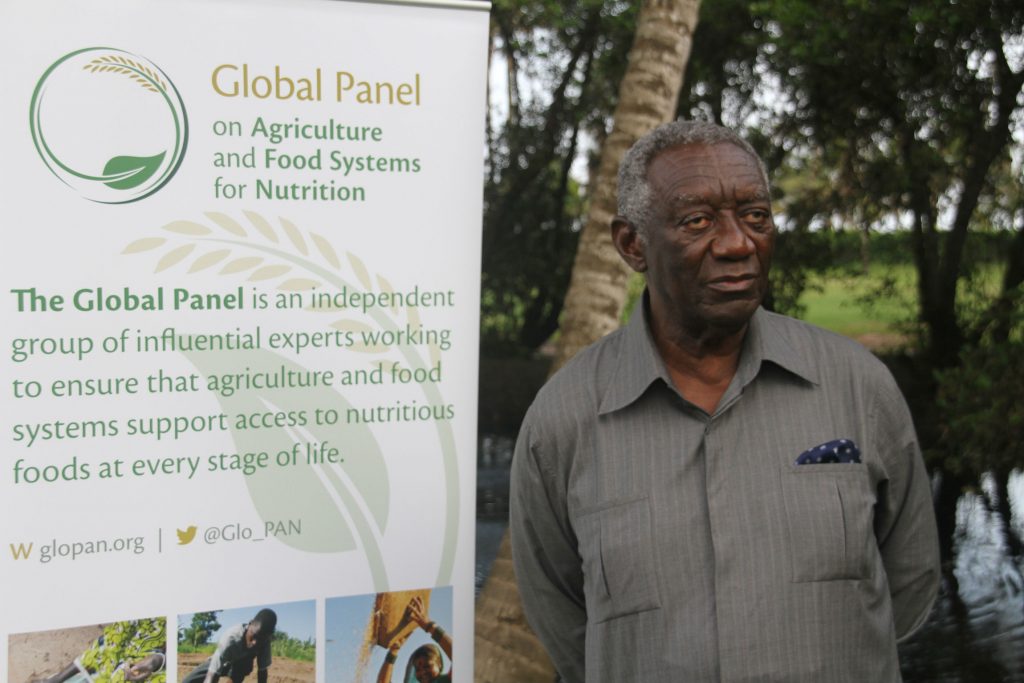Annual Global Panel Meeting – Day 2

Nutrition for Growth
During its annual meeting, the Panel acknowledged that Nutrition for Growth represents a historical time for governments across the world to identify specific opportunities for policy change that can simultaneously enhance food and nutrition security. The Panel agreed on the importance to participate to a number of activities in Rio with the aim to influence agendas in support of the achievement of the Sustainable Development Goals.
Rachel Lambert (Senior Livelihoods Adviser, Agriculture Research, DfID), Neil Watkins (Programme Officer, Programme Advocacy Team, Bill & Melinda Gates Foundation), and Mary Mpereh (Deputy Director, Policy division, National Development Planning Commission and member of the multi-sector delegation from Ghana to Brazil) were amongst those giving significant contributions.
Healthy Meals in School – Policy Brief Launch
The Gloabl Panel new policy brief Healthy Meals in Schools was launched by Professor Srinath Reddy, Global Panel member and President of the Public Health Foundation of India, and Professor Matilda Steiner-Asiedu, Associate Professor in Nutrition and Dean, School of Biological Sciences, University of Ghana.
Sir John Beddington and President John A. Kufuor, co-chairs of the Global Panel provided a welcome note.
Prof. Reddy stressed the importance of providing nutritionally balanced school meals, and explained why this represents an investment with high returns for governments: providing nutritionally balanced school meals with complementary nutrition education and health measures can deliver improved school performance, nutrition literacy as well as employment and income in later life. The procurement of food for schools from local farming communities supports farming households and livelihoods, and promotes sustainable local markets for diverse, nutritious foods.
“You are what you eat,” said Prof. Matilda Steiner-Asiedu “give children healthy school meals, and the whole society will benefit from it”. Prof Steiner-Asiedu also connected school feeding with agriculture and the broader impact on local economies: “School feeding programmes increase the demand for local farm outputs and support a more efficient local food system”.
The conversation then shifted to Gender issues and women’s leadership: “Evidence shows that local authorities perform better”, said Prof. Reddy. In addition, President Kufuor emphasised that “school feeding encourages the poorest girls go to school, which contributes to teenage pregnancy reduction”.
President Kufuor stated in his closing remarks “We believe that nutrition underpins people’s wellbeing, and I will continue to advocate for better understanding amongst people on the world stage, along with my fellow Global Panel members”.
The Foresight Project
During a following press conference , Sir John Beddington recognised that future dietary choices could make it more challenging to address the problems associated with malnutrition. For this reason, the Panel is currently gathering more evidence on how a nutritious food system can make a difference. The Panel’s Foresight project is specifically set up to look at what will happen in the future, and what the cost of action is versus the cost of inaction.
There are economic benefits to addressing malnutrition, but importantly people’s lives will be greatly improved if nutrition is taken into account. The Foresight Project aims to guide policymakers make informed decisions on agriculture, food systems and nutrition.
